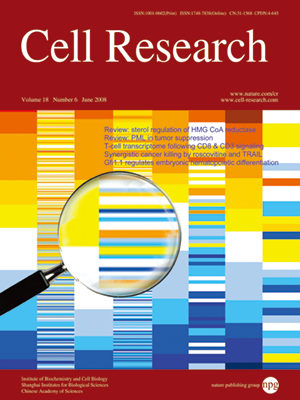
Volume 18, No 6, Jun 2008
ISSN: 1001-0602
EISSN: 1748-7838 2018
impact factor 17.848*
(Clarivate Analytics, 2019)
Volume 18 Issue 6, June 2008: 664-676
ORIGINAL ARTICLES
Roscovitine sensitizes breast cancer cells to TRAIL-induced apoptosis through a pleiotropic mechanism
Gustavo Ortiz-Ferrón1, Rosario Yerbes1, Adriana Eramo2, Ana I López-Pérez1, Ruggero De Maria2 and Abelardo López-Rivas1
1Centro Andaluz de Biologia Molecular y Medicina Regenerativa, Consejo Superior de Investigaciones Cientificas (CSIC), Avda Américo Vespucio s/n, 41092 Sevilla, Spain;
2Department of Hematology, Oncology and Molecular Medicine, Istituto Superiore di Sanit? Rome, Italy
Correspondence: Abelardo López-Rivas(abelardo.lopez@cabimer.es)
The tumor necrosis factor (TNF)-related apoptosis-inducing ligand (TRAIL/APO2L) is a member of the TNF gene superfamily that induces apoptosis upon engagement of cognate death receptors. While TRAIL is relatively non-toxic to normal cells, it selectively induces apoptosis in many transformed cells. Nevertheless, breast tumor cells are particularly resistant to the effects of TRAIL. Here we report that, in combination with the cyclin-dependent kinase inhibitor roscovitine, exposure to TRAIL induced marked apoptosis in the majority of TRAIL-resistant breast cancer cell lines examined. Roscovitine facilitated TRAIL death-inducing signaling complex formation and the activation of caspase-8. The cFLIP
L and cFLIP
S FLICE-inhibitory proteins were significantly down-regulated following exposure to roscovitine and, indeed, the knockdown of cFLIP isoforms by siRNA sensitized breast tumor cells to TRAIL-induced apoptosis. In addition, we demonstrate that roscovitine strongly suppressed Mcl-1 expression and up-regulated E2F1 protein levels in breast tumor cells. Significantly, the silencing of Mcl-1 by siRNA sensitized breast tumor cells to TRAIL-induced apoptosis. Furthermore, the knockdown of E2F1 protein by siRNA reduced the sensitizing effect of roscovitine in TRAIL-induced apoptosis. In summary, our results reveal a pleitropic mechanism for the pro-apoptotic influence of roscovitine, highlighting its potential as an antitumor agent in breast cancer in combination with TRAIL.
Cell Research (2008) 18:664-676. doi: 10.1038/cr.2008.54; published online 06 May 2008
FULL TEXT | PDF
Browse 1863


